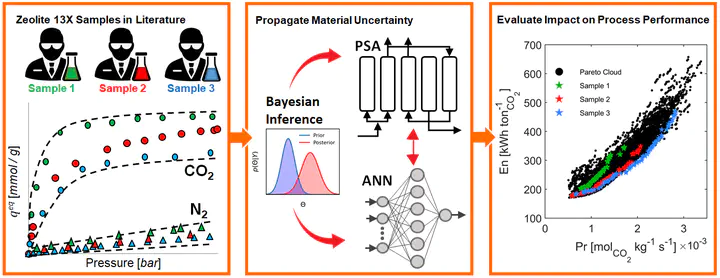Performance-based ranking of porous materials for PSA carbon capture under the uncertainty of experimental data

Abstract
The question we address in this study is how the uncertainty in equilibrium adsorption data and other properties of an adsorbent affects its ranking in screening studies for carbon capture using pressure swing adsorption (PSA). Construction of a model for a PSA simulation is normally based on a single set of experimental data, which leads to a single energy penalty-productivity Pareto front, used as the performance indicator for a given material. In reality, experimental measurements performed on the same material by different groups show a significant degree of scattering. How this scattering propagates to the process level is not known. To answer the question posed in this study, we consider the case of zeolite 13X, a well-known benchmark for carbon capture studies. Using curated experimental data from the literature, we develop a probabilistic isotherm model using hierarchical Bayesian inference. We then combine detailed process optimisation and surrogate models to explore the impact of material-level uncertainty on the behaviour of Pareto fronts. We observe that the performance of zeolite 13X is more accurately represented by a cloud of possible Pareto fronts rather than by a single Pareto front, and that characteristics of this cloud are mostly determined by the uncertainty in the adsorption data. Given the observed variability in process-level performance, materials ranking should be approached with caution as it is very likely that clouds of two distinct materials can overlap.